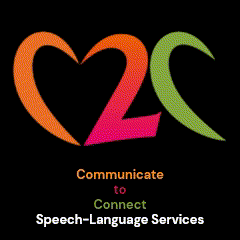We provide services for:
-
Some children have problems with receptive language, or understanding. They may have trouble:
understanding what people mean when they use gestures, like shrugging or nodding;
following directions;
answering questions;
pointing to objects and pictures; and/or
knowing how to take turns when talking with others.
Some children have problems with expressive language, or talking. They may have trouble:
asking questions;
naming objects;
using gestures;
putting words together into sentences;
learning songs and rhymes; and
using correct pronouns, like "he" or "they."
Source: American Speech and Hearing Association (ASHA)
-
Feeding disorders are problems with a range of eating activities that may or may not include problems with swallowing. Pediatric feeding disorder (PFD) is “impaired oral intake that is not age-appropriate and is associated with medical, nutritional, feeding skill, and/or psychosocial dysfunction” (Goday et al., 2019). PFD may be associated with oral sensory function (Goday et al., 2019) and can be characterized by one or more of the following behaviors (Arvedson, 2008):
refusing age-appropriate or developmentally appropriate foods or liquids
accepting a restricted variety or quantity of foods or liquids
displaying disruptive or inappropriate mealtime behaviors for developmental levels
failing to master self-feeding skills expected for developmental levels
failing to use developmentally appropriate feeding devices and utensils
experiencing less than optimal growth
Speech-language pathologists (SLPs) are the preferred providers of dysphagia services and are integral members of an interprofessional team to diagnose and manage feeding and swallowing disorders.
Source: ASHA
-
Dysphagia can occur in one or more of the four phases of swallowing and can result in aspiration—the passage of food, liquid, or saliva into the trachea—and retrograde flow of food into the nasal cavity.
The long-term consequences of feeding and swallowing disorders can include
food aversion;
oral aversion;
aspiration pneumonia and/or compromised pulmonary status;
undernutrition or malnutrition;
dehydration;
gastrointestinal complications, such as motility disorders, constipation, and diarrhea;
poor weight gain and/or undernutrition;
rumination disorder (unintentional and reflexive regurgitation of undigested food that may involve re-chewing and re-swallowing of the food);
an ongoing need for enteral (gastrointestinal) or parenteral (intravenous) nutrition;
psychosocial effects on the child and their family; and
feeding and swallowing problems that persist into adulthood, including the risk for choking, malnutrition, or undernutrition.
Source: ASHA
-
There are many reasons why you might have a speech or language problem. Some problems start in childhood. Others happen after an illness or injury. Speech-language pathologists, or SLPs, can help.
Speech Disorders
Language Disorders
Medical Conditions
Communication Options
Elective Services
-
A voice disorder occurs when voice quality, pitch, and loudness differ or are inappropriate for an individual’s age, gender, cultural background, or geographic location.
Source: ASHA
-
Dysphagia is a swallowing disorder involving the oral cavity, pharynx, esophagus, or gastroesophageal junction. Consequences of dysphagia include malnutrition and dehydration, aspiration pneumonia, compromised general health, chronic lung disease, choking, and even death. Adults with dysphagia may also experience disinterest, reduced enjoyment, embarrassment, and/or isolation related to eating or drinking.
Source: ASHA

